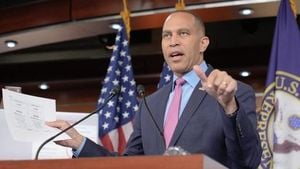On Monday, October 6, 2025, former Vice President Kamala Harris took center stage at the fourth annual "A Day of Unreasonable Conversation" summit in Los Angeles, delivering a searing critique of the Trump administration and reflecting candidly on her own political journey. The event, held at the Getty Center and attended by a constellation of celebrities, public figures, and storytellers, quickly became a focal point for national conversation—not least because of Harris’s unfiltered language and directness.
Harris, who has been touring the country to promote her new memoir, 107 Days, didn’t hold back. Addressing a packed audience of television writers, producers, artists, and digital creators, she declared, “There’s so much about this moment that is trying to make people feel like they’ve lost their minds. When, in fact, these mothaf–kas are crazy!” According to TheWrap, her words were met with raucous applause and laughter—a cathartic moment for both Harris and her listeners, many of whom are accustomed to politicians carefully choosing their words.
The summit itself was designed as a space for “candid conversations designed to challenge beliefs, expand perspectives and influence onscreen stories,” as producer Pilar Savone explained. The day’s conversations spanned a wide array of topics, from politics and social media to climate change and artificial intelligence. Yet, as NewsOne observed, the political turbulence under the Trump administration dominated much of the discussion.
Harris’s remarks were not just about venting frustration. She urged the storytellers in attendance to channel the nation’s collective emotions into their work. “You’re not passive observers, you’re living it,” she said. “I would ask you that all the emotions that we are feeling, give those emotions, gift that experience to those people that you are writing about and writing for. It gets back to my point about helping people just put a label on it, even if it doesn’t change the circumstance.” Her message was clear: in times of chaos and misinformation, artists and journalists have a duty to help the public make sense of the moment.
The context for Harris’s outspokenness is her own recent experience on the national stage. After President Joe Biden decided not to seek reelection in 2024—a decision she later criticized as “recklessness” in an excerpt published by The Atlantic—Harris launched a short but intense presidential campaign. Despite her efforts, she lost the election to Donald Trump, a defeat she described as profoundly painful. At the summit, Harris recounted the night she learned of her loss: “I couldn’t articulate anything else. I kept saying over and over again, ‘My God, my God.’ I had never felt that level of pain and grief except when my mother died, and it was grieving for the country. I knew what was going to happen.”
Her concession speech, delivered at her alma mater Howard University, was rewritten at the last minute to reflect the resilience she wanted to inspire—especially among young people. “Sometimes the fight takes a while,” she told the audience, echoing a sentiment she repeated at every campaign rally: “I believe when we fight we win.”
Harris’s critique of the Trump administration went beyond personal attacks. She described the current leadership as “dimwitted authoritarians” and pointed to the administration’s sweeping cuts to health care and social programs, mass immigration raids, and the deployment of military troops to American cities. “It feels chaotic, because every day something is happening,” she admitted, according to theGrio. But she argued that the so-called MAGA agenda is not a recent phenomenon. “Look at The Federalist Society, Heritage Foundation. They’ve been working on this stuff for decades. I’m talking about go back to Reagan. Newt Gingrich. Pat Buchanan. And the guy who’s in the White House now being kind of just almost the progeny or spawn of a toxic rule.”
Harris cautioned against focusing solely on Donald Trump as the root of the country’s current woes. “If our only focus is on Donald Trump as the reason that all this is happening, we’re gonna fall very short of the mission,” she explained. Instead, she encouraged the audience to understand the historical forces at play and to recognize the deliberate efforts to divide communities and disempower citizens.
Throughout her remarks, Harris emphasized the risks inherent in speaking truth to power, especially in an era of rampant misinformation. “There will always be risk associated with speaking truth,” she said. “It’s just a fact. And because truth often when spoken with the intent of bringing daylight, sunshine, to an issue—not for the sake of being provocative, but because it just must be told—truth can often be difficult to speak and even more difficult to hear. And so this moment, where there are so many lies and so much misinformation, the battle to tell truth is more profound than it’s ever been, because the counter forces that are spreading this information are so rampant, and ubiquitous.”
Her candor was not universally welcomed. A White House spokesperson, Kush Desai, responded to Harris’s comments with a disparaging remark, telling TMZ, “Kamala Harris should listen to an audio recording of her cackle of a laugh before calling anyone crazy.” The exchange highlights the deep divisions and personal animosities that continue to mark American political discourse.
Harris’s media tour for 107 Days has generated significant attention and ratings. Her recent appearance on The View in late September 2025 drew the show’s largest audience since June, as she discussed her differences with President Biden and the challenges she faced during the campaign. “I didn’t fully appreciate how much people wanted to know there was a difference between me and President Biden. I thought it was obvious,” she remarked, adding, “And I didn’t want to offer a difference in a way that would be received or suggested to be a criticism and, you know, in the campaign full time, I was pointing out the differences!”
Despite the setbacks and the charged political climate, Harris remains committed to using her platform to fight for truth and empower others. She calls her current tour “the Freedom Tour,” and, as NewsOne put it, she’s finally letting her hair down. “Keep telling these mothaf–kas how you really feel. We’re here for it,” the outlet cheered.
As the nation grapples with uncertainty and division, Harris’s message resonates with many who are searching for clarity and courage. Her willingness to speak plainly—sometimes profanely—has struck a chord in a country where, as she put it, “history is going to write about us, and it was important to me that that be told with my voice present.”
Harris’s words and actions serve as a reminder that, even when the political winds are turbulent and the risks are high, the fight for truth and justice endures—sometimes in the most unexpected, unfiltered moments.






